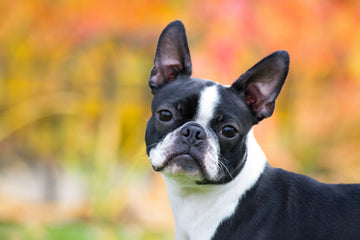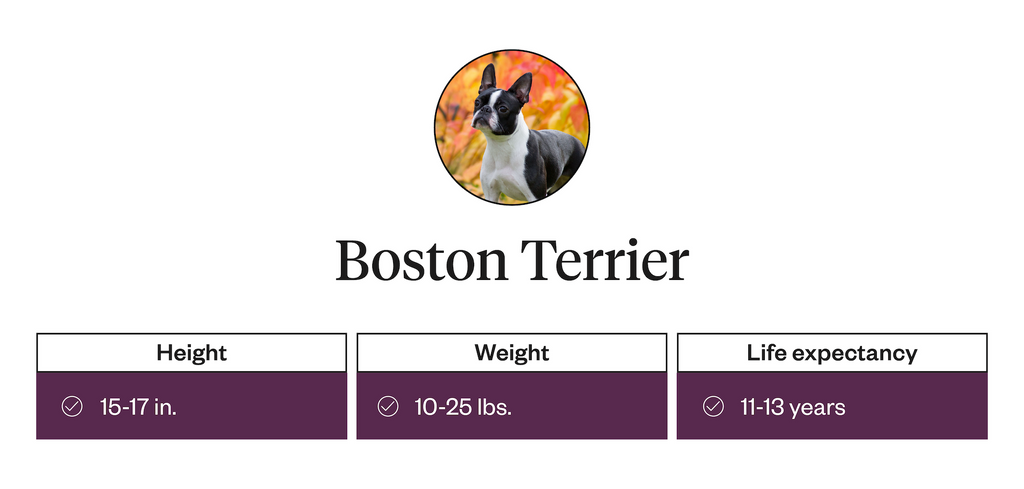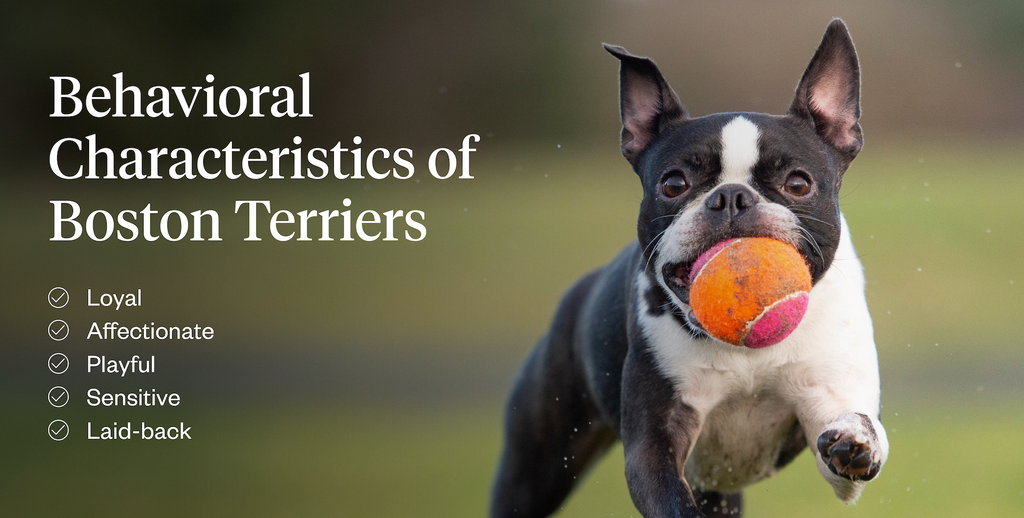9 Min Read
Boston Terrier: Pet Profile
Key takeaway

Why pet owners are switching to online vet care with Dutch
-
Prescriptions delivered free to you
-
Fast access to Licensed Vets over video
-
Unlimited video visits and follow-ups
With their classic tuxedo coat, round eyes, and big ears, the Boston terrier is a loving, sweet, happy breed. Their cheerful demeanor makes it easy for people to fall in love with these compact canines.
Boston terriers were the first breed native to the United States and are beloved dogs in Massachusetts. As a smaller dog, Boston terriers usually weigh a maximum of 25 pounds and stand about 17 inches tall, making them the perfect size for a small home or apartment living.
Continue reading to learn more about the loveable, quirky Boston terrier dog.
- History & Origin of Boston Terriers
- Physical Attributes of Boston Terriers
- Behavioral Characteristics of Boston Terriers
- Boston Terrier Health Risks
- Caring For a Boston Terrier
- FAQs
- Final Notes
History & Origin of Boston Terriers
Boston terriers were bred in the late 1800s in Boston, Massachusetts. The Boston terrier is a combination of the English bulldog and white English terrier and is one of the few breeds originating from the United States.1 Unfortunately, early incarnations of Boston terriers were a popular choice for dog fighting, a practice that is now illegal in the US.
Sometimes called “The American Gentleman” because of their tuxedo-looking coat and good manners, the Boston terrier became the Massachusetts state dog in 1970 and has been the Boston University mascot since 1922. As a distinguished breed, President Ford and President Harding had Boston terriers in office.

Physical Attributes of Boston Terriers
Boston terriers have a short muzzle, a square head, and kind, curious, mischievous eyes. They're a smaller breed, as the size differs between male and female dogs. Female Boston terriers generally weigh 10-15 pounds, while males range from 15-25 pounds, and most Boston terrier dogs are between 15-17 inches tall.
As previously mentioned, Boston terriers are known for having a tuxedo-style coat. A traditional Boston terrier is black and white; however, the American Kennel Club (AKC) recognizes five different colors in purebred dogs2:
- Black and white: The classic Boston terrier coloring.
- Black brindle and white: Black stripes with classic white markings
- Brindle and white: Brown stripes with traditional white markings.
- Seal and white: A Boston terrier that looks almost black but has reddish coloring in light.
- Seal brindle and white: Seal-colored stripes with classic white markings.

Depending on the popularity and rarity, different colored Boston terriers may cost more from a breeder.
If you’re looking to adopt a Boston terrier rescue, you’ll most likely see a variety of Boston terriers looking for homes. Some mixes will have the same characteristics and physicality as a purebred Boston terrier. Some of the most common Boston terrier cross breeds are:
- A Boston terrier and dachshund mix. The Boston terrier and dachshund are pretty intelligent, so this mix is often super bright, picks up training quickly, and is eager to please.
- A Boston terrier and Jack Russell mix tends to look more like a Jack Russell than a Boston. Bojacks are fun, energetic dogs, but Jack Russells have a history of behavioral issues, so adding a Bojack to a home with another pet may not work out.
- A cross between a Boston terrier and a beagle, a boglen terrier is a beautiful mix if you want a chill dog to hang out with.
- Going back to its roots, a Boston Bulldog is a mix between a Boston terrier and an English bulldog. Boston bulldogs are usually larger than a purebred Boston, but combining two flat-faced breeds can cause additional breathing problems.
- Also called a Bohauhau, this mixes a Boston terrier and a chihuahua. These mixes are of smaller size, usually between 6-20 pounds, and make great apartment dogs.

Behavioral Characteristics of Boston Terriers
Boston terriers are generally affectionate and loving. They are intelligent dogs who love companionship but can have a stubborn streak, too. They need regular exercise and time outside, but a short, daily walk or a quick game of fetch in the backyard is enough for these dapper dogs.
As a breed that thrives indoors, your Boston terrier will be your shadow and best friend. Boston terriers have a playful personality and can provide plenty of entertainment. While they are reasonably easy-to-care-for pets, Boston terriers can have separation anxiety if their humans leave for long periods. Many Bostons have sensitive personalities, so treats are a great incentive for training your pup.
Boston Terrier Health Risks
Boston terriers are adorable, but these American Gentlemen can have several health issues. Bostons are brachycephalic dogs, meaning they have flat faces. Other popular breeds of brachycephalic dogs are French bulldogs, English bulldogs, and pugs. It’s essential to be aware of the common health issues of Boston terriers so you properly care for your pet:3
- Breathing problems. Many brachycephalic dogs suffer from a condition called Brachycephalic Obstructive Airway Syndrome (BOAS), which encompasses a range of issues stemming from Boston terrier’s short nostrils and muzzle.
- Eye issues: A Boston terrier's big, beautiful eyes are unfortunately prone to several eye issues, such as lagophthalmos. Because of shallow eye sockets, lagophthalmos is a condition where dogs can’t fully close their eyes lids. Dogs with this condition can suffer from scarring, abnormal coloring, or sores on their corneas. Shallow eye sockets can also cause dry eye. Additionally, Boston terriers are susceptible to cataracts and glaucoma, which causes blindness.
- Allergies: Boston terriers are susceptible to skin allergies, usually around their belly, ears, and legs. You’ll notice your Boston scratching and licking their skin, along with red and flaky patches. Boston Terriers also have a sensitive immune system; many items, such as potent fragrances, medications, dust mites, household cleaners, and food products, can irritate them. Corn and soy are common food ingredients that cause itching and flatulence in Boston terriers. You can talk to a vet if you suspect your Boston has allergies.
- Knee Issues: The most common orthopedic problem in Boston terriers is patellar luxation, which means the kneecap pops out of place. Your vet will ensure your dog’s legs develop normally and encourage you to watch your dog’s weight since excess pounds can lead to knee problems.
- Epilepsy: Epilepsy is a common disorder among Boston terriers, characterized by recurring seizures. Bostons suffer from two types of epilepsy: idiopathic epilepsy, meaning there’s no underlying cause or conditions for the seizures, and structural epilepsy, usually caused by a brain tumor or other inflammatory illness.
A purebred Boston terrier may have a higher risk of congenital health problems because of the nature of breeding show-worthy dogs. If you purchase a Boston terrier puppy from a reputable breeder, they’ll provide a health guarantee that the puppy is free from disease and genetic disorders. Some breeders will also pay vet bills for unexpected–meaning not routine–medical care, but this can vary from breeder to breeder. Only purchase a Boston terrier puppy from a reputable breeder. You can search locally for “Boston terrier puppies near me” to find one in your area.
Caring For a Boston Terrier
Having a pet is a privilege, and it’s your responsibility as a dog owner to take care of your pet and provide the best care. Despite hailing from the cold northeast, Boston terriers don’t do well in cold weather. If your pup is going to be outside in frigid temperatures, it’s a good idea to get them a sweater and booties to keep their paws dry and protected.
Because of their short snouts, Bostons can quickly overheat in warm weather, so keeping an eye on them when temperatures climb is crucial. Keep your Boston terrier cool and hydrated when it’s hot.
Boston terriers have short coats and don’t need a lot of grooming, but it’s good practice to brush your dog regularly and give them an occasional bath. After all, a clean dog is a happy dog.
Make sure to provide your Boston terrier with daily exercise. Boston terriers don’t need much space, but they do require regular walks or time outside to stay active and healthy.
With regular and proper care, a Boston terrier’s lifespan is between 11 to 13 years.2
FAQs
Do Boston terriers bark a lot?
While Boston terriers aren’t known for excessive barking, every dog is different. Boston terriers are adept watch dogs but tend to be less energetic than other terrier breeds, so they may be on the quieter side. That said, it doesn’t mean your Boston terrier won’t bark when needed. Boston terriers protect their humans and bark if they see, hear, or feel a threat.
Like other breeds, sometimes Boston terriers bark when they get excited by other dogs and want to play. Playful barking is normal dog behavior as long as the barking does not get aggressive.
If your Boston terrier is barking too much, you can try a few methods to train your dog to bark less and at the appropriate times. Boston terriers are food motivated, so try using treats and other positive reinforcements for training.
Are Boston terriers cuddly?
Each dog’s personality is different, but Boston terriers are known for being affectionate family dogs. Especially if you adopt a Boston terrier puppy, you can create a strong bond as you raise your dog. Boston terrier puppies are loyal to their owners and show their love with a good cuddle session.
Are Boston terriers good pets?
Boston terriers are a good breed for families and individuals. They’re known as caring, loyal, friendly, and confident dogs. Overall, Boston terriers are friendly with kids, although they can sometimes be too energetic for small children. However, with proper training and adequate exercise, Bostons make great companions for kids.
Remember, each Boston terrier has a unique personality.

Final Notes
These charming dogs are a great blend of energetic and cuddly companions. With big eyes and a big heart, a Boston terrier can be an excellent addition to your family. They make great apartment dogs and are the perfect size for snuggling. Keep in mind that Boston terriers are known to have health issues, mainly stemming from their brachycephalic features.
If you have a Boston terrier in your life or are exploring adding a Boston to your home, the experts at Dutch can help. Talk to a licensed vet to see if a Boston terrier suits your family. If you adopt a Boston Terrier puppy or adult dog, you can use our telemedicine for pets to discuss any concerns from your home. Try Dutch today.Share
References
-
M., Heather. “8 Fun Facts About Boston Terriers.” ASPCA Pet Health Insurance, 3 Apr. 2017, www.aspcapetinsurance.com/resources/fun-facts-about-boston-terriers/.
-
“Boston Terrier.” American Kennel Club, 6 Nov. 2017, www.akc.org/dog-breeds/boston-terrier/.
-
Gardner, Donnie. “10 Common Boston Terrier Health Problems.” Boston Terrier Society, 23 June 2023, www.bostonterriersociety.com/boston-terrier-common-health-problems/.
